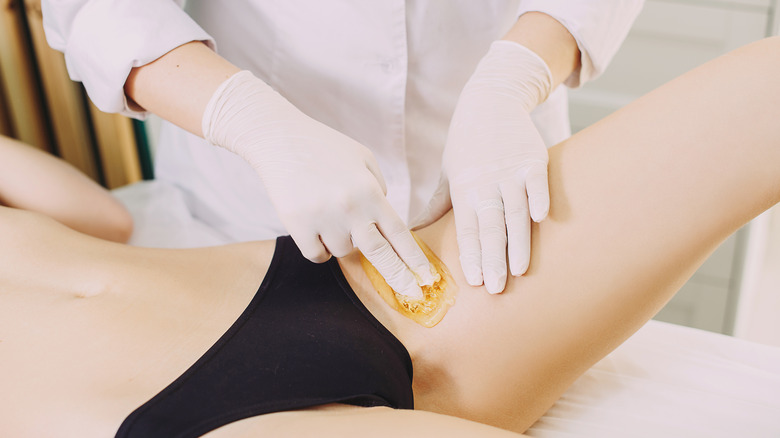The Scary Truth You Should Know Before Getting A Bikini Wax
Bikini waxes may be as commonplace as eyebrow waxes but they come with way more risks than you think. As Linda K. Franks, M.D., an assistant clinical professor of dermatology at the New York University School of Medicine told Women's Health, "Pubic hair is there for a reason to protect the sensitive skin and mucous membranes in the genital region." She went on, "Getting a wax literally strips away that layer of protection." Yikes!
Worse still, doing so can increase your risk of infections. As reported by The Independent, Dr. Emily Gibson, director of the health center at Western University in Washington State, is trying to educate women on the consequences of the common practice. She explains, "Pubic hair removal naturally irritates and inflames the hair follicles, leaving microscopic open wounds." She continued, "Frequent hair removal is necessary to stay smooth, causing regular irritation of the shaved or waxed area. When that is combined with the warm, moist environment of the genitals, it becomes a happy culture media for some of the nastiest bacterial pathogens."
Bikini waxes increase your chances of catching an STD
And that's not all! Bikini waxes also increase your chance of contracting an STD.
"The skin naturally forms a barrier between organisms, like bacteria and viruses, and the body," Nicole Budrys, M.D., medical director of the Center for Reproductive Medicine at Henry Ford Health System, explained to Shape. "Anything that causes small breaks in the skin, like shaving, makes it easier for infections to happen. It makes sense that infections like HPV and herpes, which are transmitted by skin-to-skin contact, are seen more frequently in those who shave more than twice a month," she warned. Adding, "With waxing, we know that these small skin breaks can also happen and are also likely to increase the risk of sexually transmitted diseases."
While hair removal is a completely personal decision, it's a good idea to keep these risks in mind before you book your next appointment.

